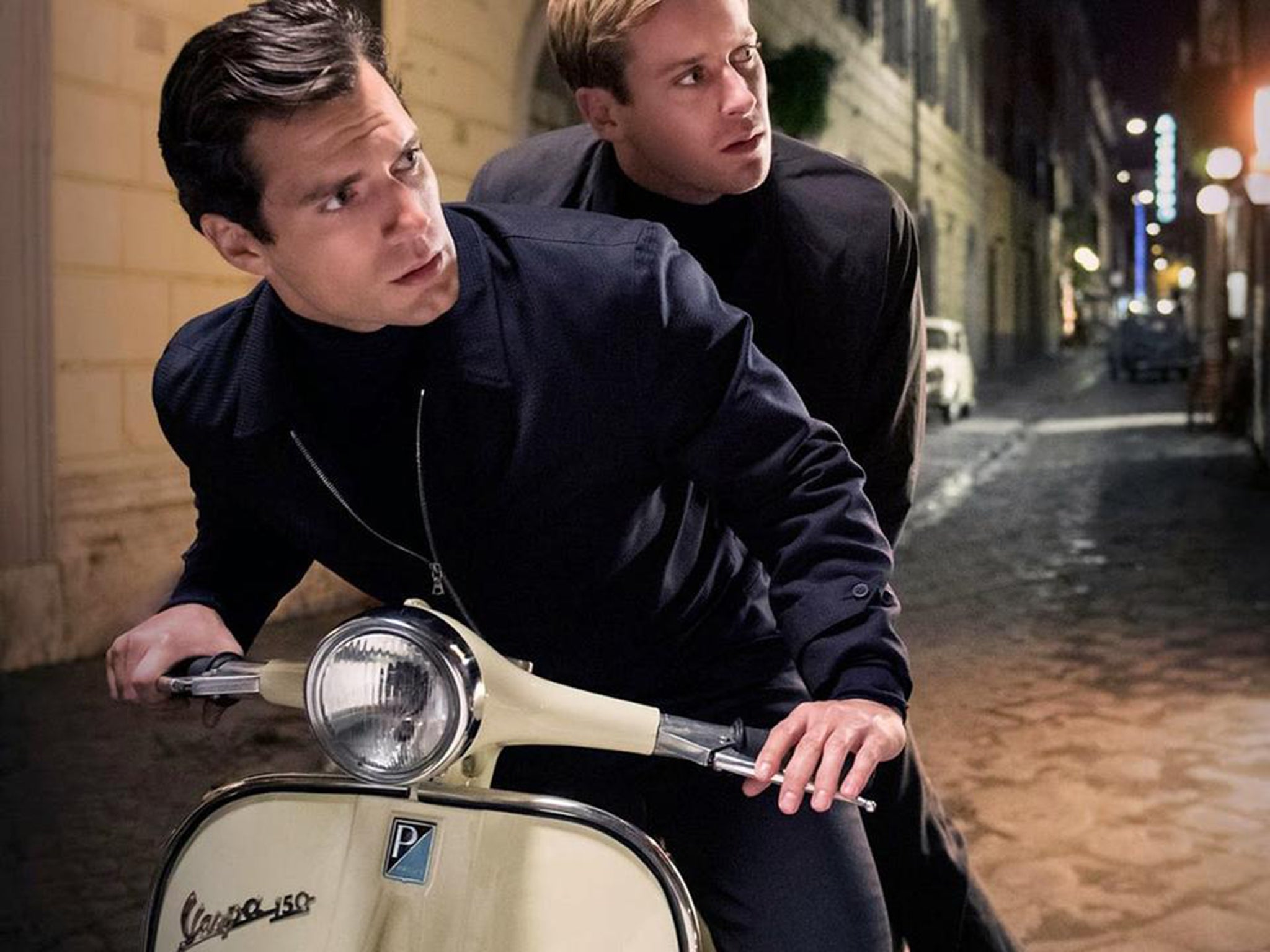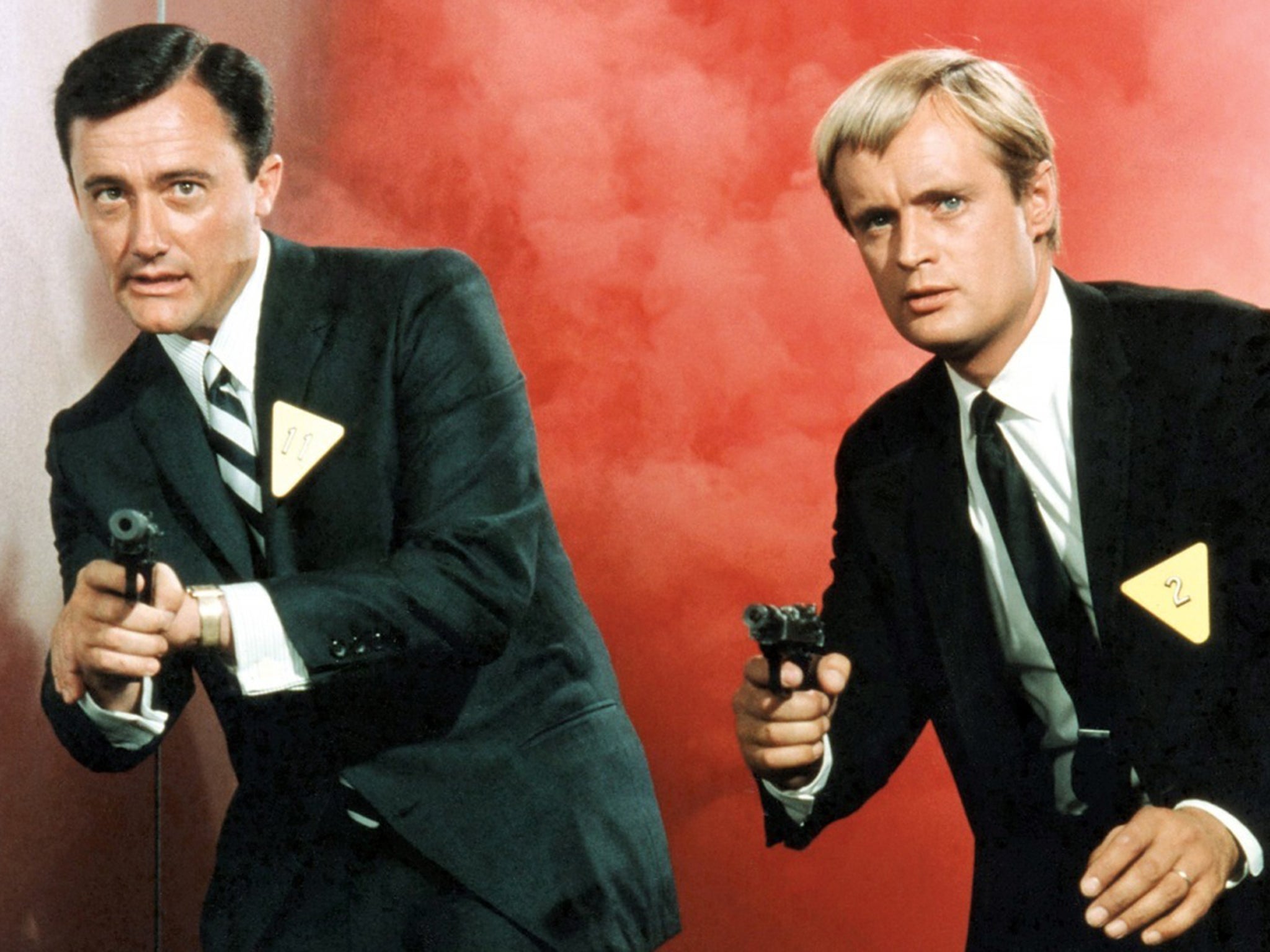The Man from U.N.C.L.E.: Will Guy Ritchie's cinema adaptation of a TV favourite fit the bill?
Ritchie isn’t so much adapting the TV series as using it as a starting point for his own voyage round early Sixties cinema and culture

Updating 1960s television shows and films has often proved a fraught endeavour. Pop culture of that era is so familiar, and so often invoked, that any film-maker revisiting it risks seeming crass and unoriginal. Is there anything left to be said about Swinging London or Michael Caine in Alfie, The Italian Job and The Ipcress File? After Austin Powers: The Spy Who Shagged Me (1999), what mileage is there in spoofing Sixties spy movies, most of which were made with tongue firmly in cheek anyway? Whether it is James Fox in a wig in Performance, David Hemmings with his zoom lens in Blow-Up (1966), or even Carl Boehm as the duffel-coated serial killer in Peeping Tom (1960), characters and images from many Sixties British movies are so familiar that they are beyond parody.
Even so, the decade continues to exercise a magnetic pull on British and US film-makers. Guy Ritchie’s The Man From U.N.C.L.E., is only the latest in a very long line of movies drawn from such prototypes. The Man From U.N.C.L.E. was a US TV show launched in 1964 in direct response to James Bond; the 007 author Ian Fleming was even loosely involved in its creation. In the early 1960s, the show’s producer, Norman Felton, met Fleming briefly to discuss a potential series.
“He [Fleming] hadn’t much involvement,” Felton later recalled. Fleming’s main contribution was to come up with Napoleon Solo, the name of the hero. “What I didn’t know was that Solo was the name that appeared in one of his James Bond books for a character who was a bad man. He never told me that.”
The series that Felton eventually made with screenwriter Sam Rolfe became very popular, partly because it was as close as the small screen came to Bond. In its re-runs at least, The Man From U.N.C.L.E. was watched as much by children as by adults. Seen today, the old shows seem very kitsch indeed. U.N.C.L.E.’s headquarters is hidden behind “an ordinary tailor’s shop” in New York. The “United Network Command for Law and Enforcement” seems a bit of a joke organisation anyway, a spoof equivalent to James Bond’s MI5 reimagined for a mainstream TV audience. The series was therefore determinedly upbeat, without the sadistic edge found in some Bond films. It was full of glamorous women, but the double entendres in the dialogue were never quite as pointed as those of 007. The fight sequences were cartoonish and camp. The series was a pastiche which was itself pastiched, eventually yielding its own spin-off, The Girl From U.N.C.L.E.

Ritchie’s new film owes as much to Fleming as it does to Napoleon Solo, and it has the look of Goldfinger-era Bond. As Solo, Henry Cavill seems more like Sean Connery than did Robert Vaughn in the TV series. His suits could have been taken straight out of Connery’s early Bond-period wardrobe. Solo’s Russian sidekick, KGB agent Illya Kuryakin (Armie Hammer), meanwhile, dresses like Robert Shaw in From Russia With Love and speaks in the same gnarled, Slavic tone, though at least he doesn’t drink red wine with the fish. He is not quite as formal as Solo but is very dapper, too, in his own Trabant-driving, flat cap-wearing way. “For us, the Sixties were the coolest decade and The Man From U.N.C.L.E. was a part of that,” the film’s producer and co-screenwriter, Lionel Wigram, has said. “Whether it was the clothes, the cars, the movies, or the design, the Sixties really marked the beginning of the modern age.”

It is telling that Wigram defines this modern age in terms only of visual signifiers. He and Ritchie do not seem much interested in 1960s social or political change, the shifts in attitudes towards gender and class or the emergence of a new and defiant form of youth counterculture. The Beatles don’t feature here, nor is there any hint of anything as uncouth as men with long hair, sideburns or psychedelic leanings. Other film-makers who tried to reinvent 1960s films and TV dramas for contemporary audiences often risked coming seriously unstuck because they moved too far away from the original. For example, the 2004 live-action version of Gerry Anderson’s Thunderbirds seems in hindsight like an object lesson in how not to customise an old favourite for a new audience. It was too far removed from the original to mean much to older fans and yet didn’t succeed in appealing to a younger generation. Anderson himself was said to have been bitterly disappointed by the movie.
Ritchie’s revisiting of U.N.C.L.E. is more successful. It stands by itself and shouldn’t confuse newer cinemagoers who have never heard of Robert Vaughn or David McCallum (llya Kuryakin first-time round). Ritchie isn’t so much adapting the TV series as using it as a starting point for his own voyage round early Sixties cinema and culture. He and Wigram cite Antonioni and Fellini (La Dolce Vita) as influences. They are evoking an early Sixties Eurotrash wonderland when the men had their hair cut short, wore suits and looked like Marcello Mastroianni or Sean Connery, while the women were as glamorous and as extravagantly dressed as Jackie Kennedy or Monica Vitti.
There is something fetishistic about the sheer level of detail that has gone into costume and production design. The film-makers have spent so much time getting Cavill’s suits measured, styling villainess Elizabeth Debicki to look like a supermodel, securing the Vespas and recreating Cold War Berlin and Fellini-esque Rome that the film has the look of a luxury-goods advertising spread. It is the 1960s as Ritchie wants them to be, not as they ever really were.
‘The Man from U.N.C.L.E.’ is released on Friday
Join our commenting forum
Join thought-provoking conversations, follow other Independent readers and see their replies
Comments